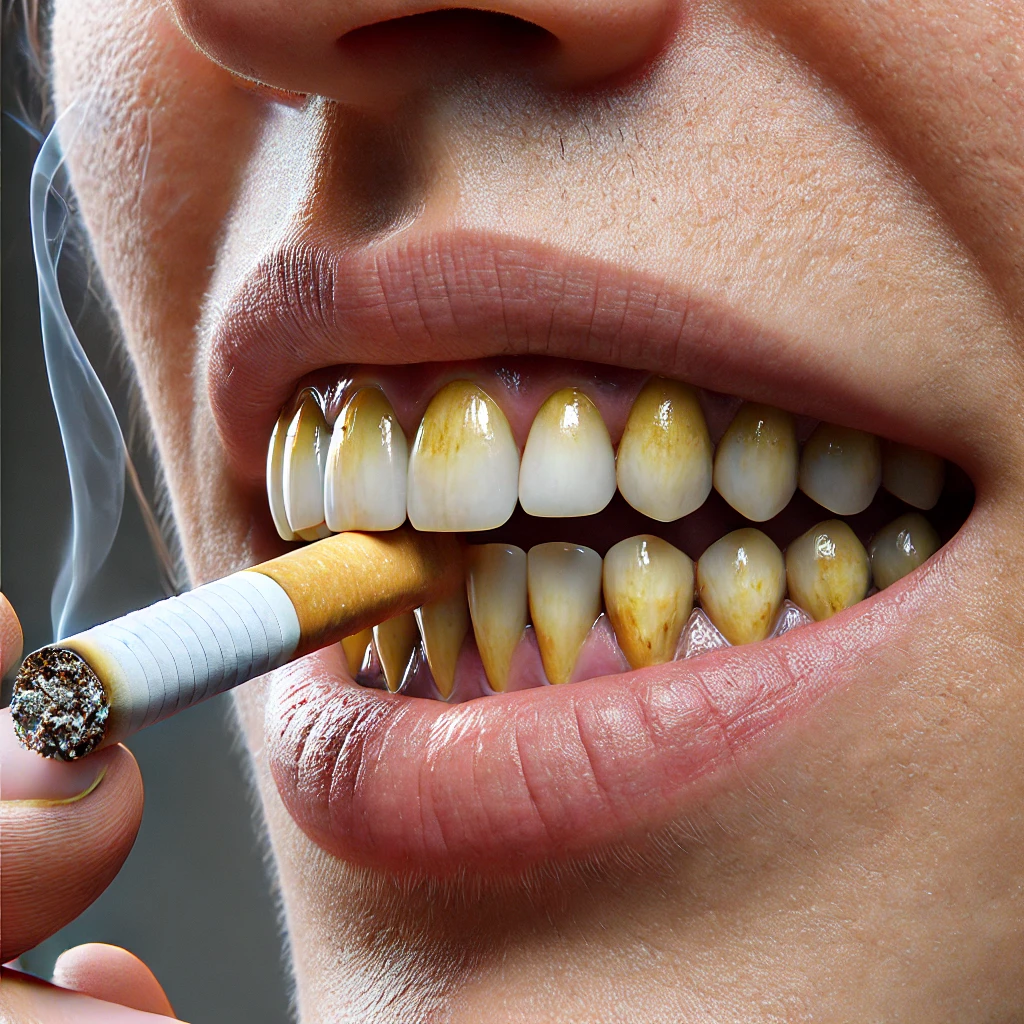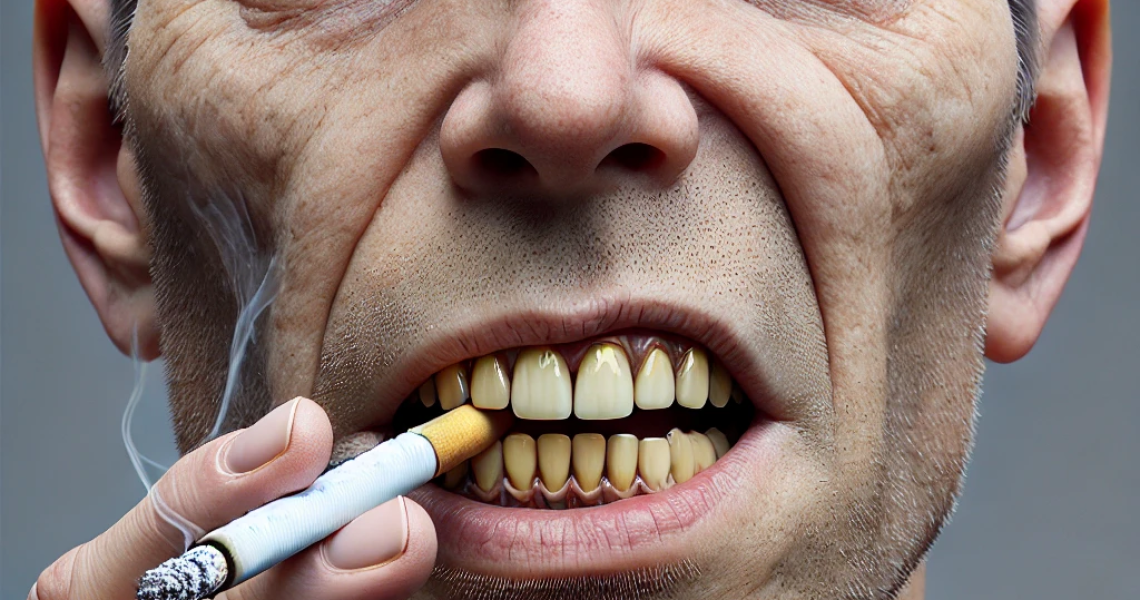Tobacco is a scourge for general health, but did you know that it’s also one of the worst enemies of your oral health? Smoking can have serious consequences for your teeth and gums. In this article, we’ll look at the impact of smoking on your teeth, explain why smoking cessation is essential for preserving your smile, and introduce you to the anti-smoking laser as an effective solution for quitting smoking.
Tobacco: a silent threat to your teeth and gums
Tobacco consumption has many harmful effects on oral health, often underestimated by smokers. Here are the main problems it causes:

1. Yellowing teeth
Tobacco contains nicotine and tar, two substances responsible for yellowing teeth. These particles attach themselves to the enamel, leaving a yellow or brownish discoloration that is difficult to remove by simple brushing. This situation also contributes to smokers’ perception of dental problems.
2. Increased tartar build-up
Cigarette smoke promotes tartar build-up on teeth, increasing the risk of oral infections. Tartar is a breeding ground for bacteria, which can lead to cavities and gum tissue inflammation.
3. Periodontal disease
Smoking weakens the immune system, making gums more vulnerable to infection. Smokers are therefore more likely to suffer from gingivitis and periodontitis, conditions that can lead to tooth loss if left untreated. A note from World Oral Health Day points out that periodontal disease is on the rise among smokers.
4. Bad breath
Tobacco particles also settle on the tongue and mucous membranes, causing unpleasant breath, known as halitosis. This problem can affect self-confidence and social interaction. A specialist dentist notes that the chemicals in cigarettes are often responsible for these persistent odors.
When they stop smoking, smokers notice a gradual improvement in their breath. According to Paris dentist Dr Sophie Lefrançois, “Smoking cessation rapidly reduces odours caused by smoke and toxins in the mouth. As a complement, scaling and thorough cleaning can accelerate this process.”
What’s more, improved saliva production after smoking cessation plays a crucial role in reducing bad breath. Saliva helps to naturally eliminate waste and particles stagnating in the oral cavity, promoting fresher breath. By adopting rigorous oral hygiene, including tongue brushing, ex-smokers can regain healthy breath.
Patients who have stopped smoking also report a clear difference in oral comfort. Dr Michel Dupont, oral health specialist, adds: “After smoking cessation, the oral flora regains its natural balance, which contributes directly to better breath quality.” This result is amplified when combined with specialized products such as mouthwashes or targeted toothpastes.
5. Risk of oral cancer
Tobacco is a major risk factor for oral cancer. Smoke contains carcinogenic substances that can damage oral tissue cells, increasing the risk of malignant tumors. According to a report on smoking, serious oral diseases, such as cancer, are directly linked to smoking.
You may also be interested in this article: Anti-smoking laser: Is it really effective?
Why smoking cessation is essential for dental health.
Quitting smoking is undoubtedly the best decision you can make to preserve your oral health. Here are the main benefits of quitting on your smile:
1. Reduces yellowing of teeth
By quitting smoking, you prevent new stains from forming on your teeth. It also makes teeth whitening treatments more effective and reduces dental problems.
2. Reduced risk of periodontal disease
Once you stop smoking, your immune system begins to strengthen, making your gums more resistant to infection. Gum tissue gradually regenerates, reducing the risk of periodontal disease.
3. Improved breath
Over time,smoking cessation reduces halitosis caused by smoke residue and bacteria in the mouth.
4. Reduced risk of oral cancer
By eliminating carcinogenic substances, you considerably reduce your chances of developing oral cancer. Recent dental studies show a marked improvement in health after weaning.
The anti-smoking laser: an effective solution for quitting smoking
Despite the many benefits of smoking cessation, quitting remains a challenge for many smokers. Fortunately, innovative solutions, such as anti-smoking lasers, can help you get over this hurdle.
1. What is the anti-smoking laser?
Anti-smoking laser is a technique based on auriculotherapy, a method inspired by acupuncture. It uses a gentle laser to stimulate specific points on the ear. These points are linked to the nervous system and play a key role in addiction management.
2. How does the treatment work?
The laser works by reducing nicotine-related withdrawal symptoms, such as anxiety, irritability and cravings. In a single session, this method can help up to 90% of patients quit smoking.
3. The benefits of anti-smoking laser
- Non-invasive: Unlike other methods, laser treatment is painless and requires no medication.
- Fast: A single session is generally enough to achieve results.
- Effective: The high success rate makes it a serious option for smokers who want to quit for good.
- No side effects: unlike some chemical treatments, laser treatment entails no health risks. This technique also preserves oral tissues weakened by smoking.
4. A positive impact on oral health
By opting for an anti-smoking laser, you protect your teeth by eliminating the harmful effects of cigarettes. You avoid periodontal disease, stained teeth and the risk of oral cancer. Dentists report a marked improvement in dental problems in patients who have quit smoking.
Tips for restoring optimal oral health after quitting smoking
Once you’ve successfully quit smoking, it’s essential to take care of your teeth and gums to reverse the damage caused by smoking.
Here are a few recommendations:
1. See a dentist regularly
Schedule visits to the dentist for scaling and a thorough examination of your mouth. These visits can help identify potential problems at an early stage.

2. Adopt good oral hygiene
Brush your teeth at least twice a day with a fluoride toothpaste. Don’t forget to floss to remove plaque from hard-to-reach areas. A high level of care effectively prevents dental problems.
3. Opt for tooth whitening
If your teeth are yellowed from years of smoking, a teeth whitening treatment can help you regain a bright smile. Professional products are recommended for optimal results.
4. Eat a healthy diet
A diet rich in crunchy fruits and vegetables, such as apples or carrots, can help clean your teeth naturally. Oral tissues also benefit from these nutritious foods.
5. Moisturize your mouth
Smoking can reduce saliva production, increasing the risk of cavities. After quitting, drink plenty of water to keep your mouth hydrated.
Conclusion
Tobacco represents a serious threat to your teeth, causing serious aesthetic and health problems. Quitting smoking is the best decision you can make to preserve your teeth and gums. Among the solutions available, the anti-smoking laser stands out for its effectiveness and non-invasive nature. By taking care of your oral health after quitting smoking, you can not only restore the radiance of your smile, but also protect your overall health.
Why not take the plunge today? Your smile, your gums and your health will thank you. If you’re interested in this topic, feel free to explore other articles on innovative smoking cessation methods!
The media are talking about Mylasertabac :
sinactiv.fr, naturopat.fr, sante-et-beaute.fr, monparrainsante.com,hypnoandco.com,l-hexagone.fr, mondentistechampigny.fr, france-pharmacies.fr, santeplusmag.com, auriculaire.com,
